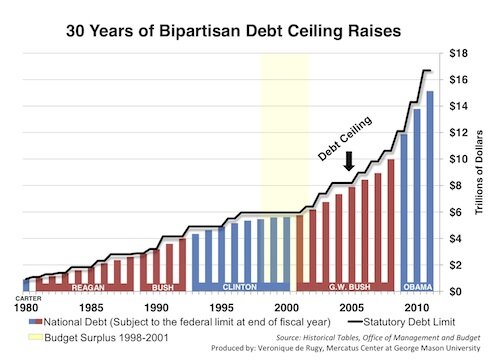
No Need to Raise the Debt Ceiling: The US Won’t Default
October 7th, 2013Throughout recent history, Republicans and Democrats have always blindly voted to raise the debt ceiling whenever federal spending has approached the nation’s debt limit. Congress continues to appropriate more money than it takes in through revenues, and this is causing the United States to spiral towards a volatile debt crisis that could bring world markets to the brink. Now, the federal government is running out of money again, and politicians are using scare tactics to pressure members of Congress into raising the debt ceiling.
President Obama has alleged that a failure to raise the debt limit would result in the US defaulting on its debt obligations, thus crushing the nation’s credit rating and laying waste to the world economy. However, as Jeffrey Dorfman at Forbes pointed out, the federal government brings in sufficient income to cover interest on the national debt, along with a vast array of programs and initiatives including Social Security, Medicare, Medicaid, veterans benefits, environmental conservation, transportation, law enforcement, food stamps, and more, with additional funds left over to run the military at 2003 levels. Why are politicians misleading the public and the markets by saying that the US would default on its debts if the debt ceiling vote were to fail?
The Federal Government Has Plenty of Money to Pay Its Debts
, US Senator Rand Paul pointed out that the federal government brings in around 250 billion dollars per month, and interest payments on the national debt are around 20 billion dollars per month. The Constitution requires that the national debt be paid, so it wouldn’t even be legally possible for the US to default on its debts unless revenues were slashed exponentially. Instead, Congress overspends on each budget and then claims that the new items that were appropriated are “debts” that must be paid back, even though the funding typically winds up going to new programs that haven’t been created yet.
This would be like if a family had decided in a previous year to purchase a new TV in the future, only to discover that the funds weren’t there due to rising interest payments on a credit card, and, as a result, took a payday loan out on a car title or house note to buy the TV anyway, thus pushing monthly interest payments up even further. When put in the context of a family or business budget, such behavior seems absurd and would lead inevitably to a default.

By Bringing Default into the Debt Limit Debate, the Administration Is Hurting America’s Credit Rating
It’s legally unreasonable to suggest that the US could default on its debts this month if the debt ceiling isn’t raised. However, the act of suggesting that it could might provoke credit rating agencies to downgrade the nation’s credit score. Last time this issue presented itself, President Obama claimed that a failure to raise the debt limit would result in a credit downgrade. After the debt ceiling was raised, America’s credit rating was downgraded anyway.
In reality, the United States can’t solve its debt crisis by continuing to overspend, and it certainly can’t do so by continually borrowing increasing amounts of money to pay growing interest payments. Eventually, the interest payments will outpace revenues, making it impossible for the federal government to continue funding programs. For now, however, without raising the debt limit, the US government can easily afford to cover interest on the debt along with nearly every program Americans are accustomed to, given the fact that the feds are set to bring in 3 trillion dollars over the coming fiscal year.
Silver Circle is OUT NOW --> -->on DVD and Blu-Ray --> --> and showing on Video on Demand platforms! Check it out on our watch online page and find out about local theater showings of the film and other special events on our -->event page -->.


